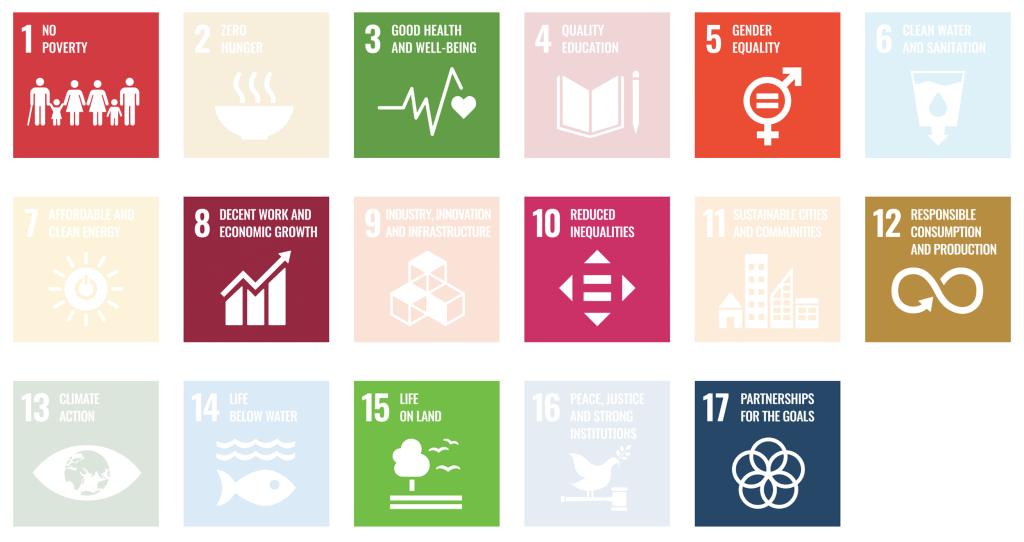our commitment to u.n. Sustainable development goals
September 2, 2024 | Nahua Expeditions
The United Nations launched the “2030 Agenda for Sustainable Development” to provide a blueprint for a better future of peace and prosperity for the entire world. At its core, the Agenda is defined by 17 Sustainable Development Goals, or SDGs. These goals recognize that in order to help people and the planet, initiatives must address poverty, inequality, and the climate crisis, while also spurring economic growth and preserving biodiversity.
The tourism industry is uniquely positioned to profoundly influence the social, economic, and environmental well-being for many countries due to its extensive access to the global economy. It provides a valuable opportunity to meet the needs of visitors while also delivering significant benefits to host communities.
Nahua Expeditions is deeply invested in ensuring that our tourism model is structured to benefit communities, and not just generate profit. Our efforts currently apply to 8 out of the 17 U.N. Sustainable Development Goals. We leverage the power of beautiful yet vulnerable natural attractions to inspire a more sustainable business model in the world of tourism. We strive to lead the way in redefining ecotourism, ensuring it is both sustainable and beneficial to local communities and the environment.
The U.N. Sustainable Development Goals That We Target:

United Nations Sustainable Development Goals, source: https://sdgs.un.org/goals
ABOUT THE AUTHOR

NICOLE WALLACE
Biologist, Adventure Photographer
Head of Operations, Nicole is passionate about translating Nahua Expedition's conservation and sustainability goals into tangible results. With experience in start-ups and a background in Biology, Nicole is driven to build a tourism model that serves both local communities and the environment.
Goal #1: No Poverty
Our expeditions are operated in remote and rural villages that are inhabited by people with low socioeconomic status and limited sources of income. By involving local communities in our operations, we create job opportunities that stimulate and boost the community’s economy. Instead of relying on work outside of their village in construction or agriculture, locals can now find employment with Nahua Expeditions as river guides, porters, forest guardians, and sustainable infrastructure builders. Lifting people out of poverty begins with the opportunity to make an income within one’s own community.

Goal 1 infographic, source: https://unstats.un.org/sdgs/report/2023/
Goal #3: Good Health and wellbeing
Before the conception of Nahua Expeditions, our founder began with a mission to build clean, efficient cookstoves for families in rural villages. Our expedition company was born to fund this initiative. Our stove design features a closed combustion chamber, reducing firewood consumption, and channeling smoke out of the home through a ventilation pipe. This design not only drastically reduces wood consumption, but also protects users from harmful smoke inhalation. Daily smoke exposure for these rural families has an equivalent impact to smoking 3+ packs of cigarettes daily, and can lead to serious health issues including respiratory infections and chronic diseases. This disproportionately impacts the women, who are traditionally responsible for cooking, and typically spend the majority of their day in the household. As our stoves quickly grow more popular in the surrounding villages, more people are granted longer and healthier lives. Read more about the success and impacts of our stoves in our other blog posts.

Goal 3 infographic, source: https://unstats.un.org/sdgs/report/2023/
Goal #5: Gender Equality
Through our operations, we make a significant effort to actively employ men and women equally. We provide employment to women as porters, trail maintenance crew, and garbage pick up collectors in the same way that we offer those roles to men. In addition, our local home-stays are hosted by local women. As a result of our efforts, a significant portion of our local support is comprised of women. This culturally uncommon business exchange demonstrates the financial power women have in their role in the household. Compensating women for their work within our company provides an opportunity for economic engagement, thus bringing these rural communities closer to gender equality. Rewriting the script for tourism in this way paves the way for women to have a seat at the table in this new industry model.

Goal 5 infographic, source: https://unstats.un.org/sdgs/report/2023/
Goal #8: Decent Work and Economic Growth
Introducing sustainable tourism to regions without a history of tourism creates new job opportunities and fosters creativity, innovation, and entrepreneurship within local communities. Currently, many communities in remote regions rely on their land for immediate needs like fuel, shelter, and profit, contributing to deforestation and environmental degradation. By shifting reliance away from these fragile resources through economic incentive to protect the land for ecotourism, communities can achieve sustainable economic growth. As our expeditions gain popularity, increased competition among tourism companies will further boost the local economy. Nahua Expeditions aims to pioneer high-value, responsible and sustainable ecotourism, setting an example for other businesses and initiatives to follow.

Goal 8 infographic, source: https://unstats.un.org/sdgs/report/2023/
Goal #10: Reduced Inequalities
Equitable access to financial gain requires investment in skills development and expanding global market reach. Nahua Expeditions promotes regional equality by creating income opportunities for less developed communities. We invest in career development by providing job training for villagers to become skilled tour operators and guides. Our focus on wilderness safety and client satisfaction ensures that these communities will retain high standards for their own, or future tourism operations. By connecting these communities to international tourism, we support their financial independence and expand their global reach. Every traveler with Nahua Expeditions contributes to this effort, investing in the economic empowerment of vulnerable communities.

Goal 10 infographic, source: https://unstats.un.org/sdgs/report/2023/
Goal #12: Responsible Consumption and Production
We are combating deforestation by replacing traditional open flame stove tops with efficient, enclosed cookstoves. Our stoves require half the wood of traditional open flame setups, reducing the rate of deforestation by upwards of 50%. We also plant native species to restore forests and support biodiversity. Over the past year, we’ve planted over 150,000 trees and plan to continue ramping up our efforts. By protecting the ecosystem, we support a sustainable ecotourism industry that values and preserves the land it operates and relies on.
Nahua Expeditions also advocates for responsible and eco-friendly infrastructure development in surrounding villages. Our workers participate in local meetings and vote for eco-friendly, responsible development and quality tourism. We actively oppose plans to build roads and parking lots aimed at facilitating increased tourist access to natural sites. We also advocate against the construction of infrastructure around fragile environment such as caves and waterfalls, which would further strain these natural features. Through these efforts, we strive to preserve the natural beauty and biodiversity of these regions for future generations.

Goal 12 infographic, source: https://unstats.un.org/sdgs/report/2023/
Goal #15: Life on Land
We are fighting deforestation by replacing traditional open flame stove tops with efficient wood burning stoves. Our stoves use half the wood of traditional open flames, reducing the need for villagers to cut down nearby trees. We also plant native species to restore forests and support biodiversity. Over the past year, we’ve planted over 100 trees and plan to ramp up our efforts over the next three years. By protecting the ecosystem, we support a sustainable ecotourism industry that values and preserves the land.
Nahua Expeditions also advocates for responsible and eco-friendly infrastructure development in surrounding villages. Our workers participate in local meetings and vote to fight for eco-friendly, responsible development and quality tourism. We actively oppose plans to build roads and parking lots aimed at increasing tourist access to natural sites. We also resist proposals for concrete stairs and metal ladders around delicate waterfalls, which would further strain these fragile attractions. Through these efforts, we strive to preserve the natural beauty and biodiversity of these regions for future generations.

Goal 15 infographic, source: https://unstats.un.org/sdgs/report/2023/
Goal #17: Partnerships for the Goals
This goal is about mobilizing and expanding financial resources for participation in the global economy. Even in a country such as Mexico with high economic stability, economic disparities between urban and rural areas remain significant. Many communities are still being left behind in the global accumulation of wealth. To address this, we support rural communities in developing industries centered around their greatest asset: their land. As Nahua Expeditions demonstrates how leveraging local resources in ecotourism can empower rural villages to boost their local economies and engage in global travel markets, this business model can be replicated in areas beyond where Nahua operates. Nahua’s innovation in ecotourism sets a high industry standard, empowering rural villages to boost their local economies and engage in the global travel market.

Goal 17 infographic, source: https://unstats.un.org/sdgs/report/2023/
Lastly, although this initiative does not fit into any of the UN SDGs, this company value is still worth mentioning here:
In order to safeguard destinations from the adverse effects of over-tourism and resource depletion, we never publicly release the names of places we visit. Despite our efforts, the regions we visit are not fully equipped to handle mass-tourism. The communities still lack adequate training, infrastructure, and regulations. We recognize our platform and the impact we have on these remote and fragile regions. So, as a result, we do not publicize location names in any of our website material, social media posts or other promotional material. We also encourage our guests to do their part in keeping names of regions away from social media, preferably to word of mouth. This practice protects the environmental exploitation from over-tourism and promotes a standard of quality over quantity in ecotourism.
When you invest in nature, nature will invest in you
Nahua Expeditions takes on a unique and creative approach to building an ecotourism model that not only incorporates the involvement of locals, but directly serves the well being of the community through stove building, tree planting, and environmental clean up. This experienced improvement of everyday life for villagers incentivizes their community to protect their land because of its intrinsic economic value in ecotourism. Conservation of biodiversity, in both ecosystems and culture, provides long term resiliency among communities.
With every expedition that we lead, we inspire a new cohort of travelers to choose a sustainable future. We show guests that visiting an ecoattraction doesn’t have to be at the expense of the land, instead, it can be an investment towards improving and protecting the land they visit.
ABOUT THE AUTHOR

Nicole Wallace
Biologist, Adventure Photographer
Head of Operations, Nicole is passionate about translating Nahua Expedition's conservation and sustainability goals into tangible results. With experience in start-ups and a background in Biology, Nicole is driven to build a tourism model that serves both local communities and the environment.
